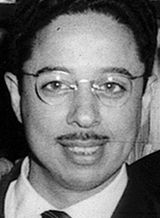Horacio Salgán
Horacio Salgán | |
|---|---|
 | |
| Born | June 15, 1916 Buenos Aires, Argentina |
| Died | August 19, 2016 (aged 100) Buenos Aires, Argentina |
| Occupations |
|
Horacio Adolfo Salgán (June 15, 1916 – August 19, 2016) was an Argentine
Afro-Argentine family.[2] Some of Salgán's most well-known compositions include Del 1 al 5 (Días de pago) (1944), A Don Agustín Bardi (1947), Entre tango y tango (1953), Grillito, La llamo silbando, Cortada de San Ignacio, A fuego lento, and Aquellos tangos camperos. He turned 100 in June 2016[3] and died two months later on August 19, 2016.[4]
Salgán began studying piano at age six. At age 18 he joined the cast of Radio Belgrano as a soloist and back-up musician. At 20 he was discovered by orchestra leader
Tango, no me dejes nunca as part of El Nuevo Quinteto Real, an incarnation of the original group. In 2005 Konex Foundation from Argentina granted him the Diamond Konex Award
, one of the most prestigious awards in Argentina, as the most important personality in the popular music of his country in the last decade.
References
- ^ Pfeiffenberger, Sylvia (May 10, 2006). "The blackness of tango". indyweek.com. Retrieved 2016-08-21.
- ^ "La historia negra del tango" (PDF). Museo Casa Carlos Gardel (in Spanish). Gobierno de la Ciudad de Buenos Aires. 5 June 2010. Archived from the original (PDF) on 2 October 2012.
- ^ Mareco, Alejandro (2016-06-15). "El maestro Horacio Salgán cumple 100 años". Vos (in Spanish). Retrieved 2016-06-16.
- ^ "Murió Horacio Salgán, a los 100 años" (in Spanish). August 19, 2016. Retrieved 2016-08-21.
- Horacio Salgán at IMDb
External links
Wikimedia Commons has media related to Horacio Salgán.
Video recordings
- "A Fuego Lento" on YouTube Played by Pasquale Stafano and Gianni Iorio
- "A Don Augustin Bardi" on YouTube Played by Horacio Salgán and Ubaldo de Lío
